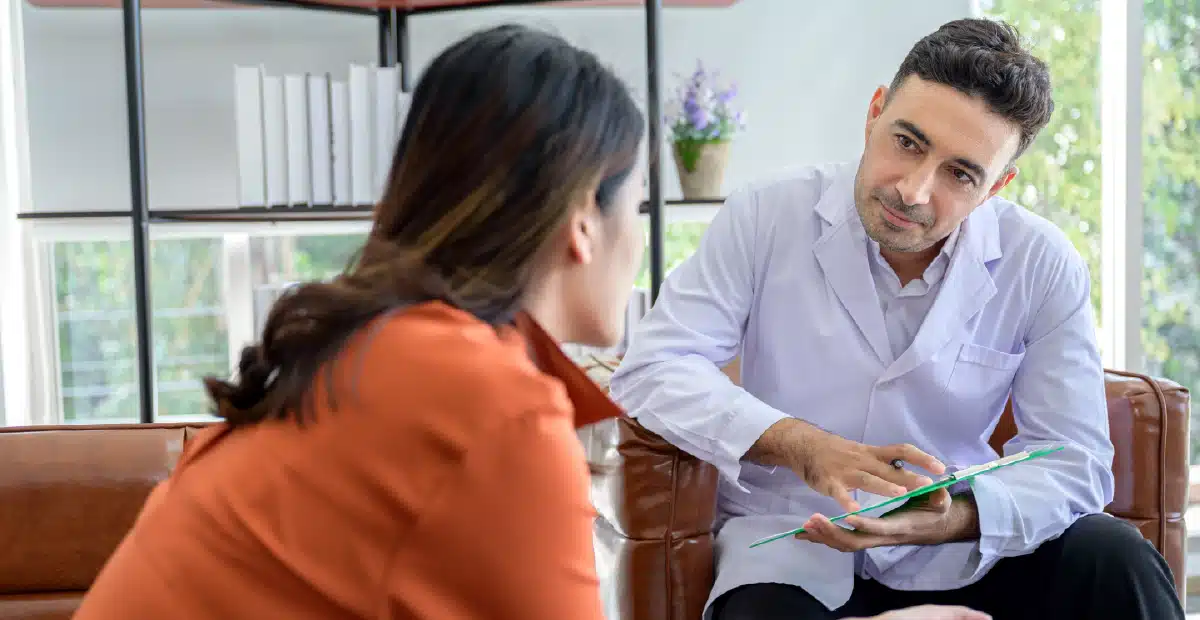Our Partial Hospitalization Program (PHP) at Northbound Treatment is often the recommended step for individuals exiting residential treatment and looking for extended structure and ongoing care. It is the highest level of care after residential, providing daily, intense, and consistent support.
PHP helps patients hone the skills they learned during residential treatment while continuing to receive support as they explore their independence after exiting inpatient care. Partial hospitalization programs often offer the same therapies and activities as residential programs, with similar structure and intensity, but more flexibility.
Our PHP meets almost daily and allows patients to benefit from professional treatment for up to 6 hours a day. In our PHP, patients work with personalized treatment plans that may include individual therapies, group therapy, psychiatric care, and holistic activities.
How Does PHP Differ from Residential or Intensive Outpatient Care?
PHP acts as a bridge between residential treatment and our Intensive Outpatient Program (IOP). Although most PHP programs allow patients to return home in the evenings after treatment, our PHP acts as an extension of residential, continuing to provide safe and secure living spaces for those in recovery.
PHP is more structured than an IOP. While IOPs only meet a few times a week for a few hours at a time, PHPs meet daily and often for the entire day (6 to 8 hours).
Our Evidence-Based Therapies You’ll Experience
There are several kinds of mental health therapies that are considered “evidence-based”. This means that these therapies have gone through rigorous, peer-reviewed research studies proving that they are effective treatments for substance abuse and co-occurring mental health disorders [1].
Some are used to address specific mental health challenges, such as addiction, trauma, anxiety, or depression. Two of the most common evidence-based mental health therapies we use here at Northbound are Cognitive Behavioral Therapy (CBT) and Eye Movement Desensitization and Reprocessing (EMDR).
CBT: Rewiring Your Brain’s Response
CBT is one of the most widely used evidence-based therapies for substance abuse and co-occurring mental health disorders. According to the National Institute of Health, 60% of individuals who receive CBT treatment for substance abuse disorder are able to maintain their recovery for up to a year compared to those who only received conventional addiction therapy that doesn’t address underlying mental health problems [2].
CBT is considered a short-term, goal-oriented therapy. Using guided discussions, activities, and worksheets, CBT helps individuals reframe negative thoughts that drive substance abuse and build positive coping skills to prevent relapse.
Some of the skills individuals learn during CBT include:
- Behavioral Activation: Encourages patients to engage in healthy, positive activities that bring them a sense of well-being.
- Problem-Solving: The therapist helps the patient fine-tune skills like brainstorming, analytical thinking, collaboration, and decision-making.
- Cognitive Restructuring: Challenges negative, maladaptive thoughts with a more realistic and neutral perspective.
- Setting Goals: Patients develop goals for both in and outside of treatment. Throughout the course of CBT they will make action plans to achieve these goals, and check in for progress.
- Self-Monitoring: Individuals build self-awareness by learning how to track their thoughts, feelings, and moods and learn how those influence their behavior.
- Deep Breathing and Progressive Muscle Relaxation: Helpful for nervous system regulation and managing stress.
EMDR Explained: Why Moving Your Eyes Helps Heal Trauma
EMDR is typically used in the treatment of trauma and post-traumatic stress disorder (PTSD). According to research, EMDR has a success rate of 60% to 80% in helping individuals process trauma and trapped emotional distress, which can influence substance abuse [3].
EMDR is a structured trauma treatment, administered in 8 distinct phases. Therapists use guided eye movements and auditory stimulation to help put the brain into a state of relaxation that makes it easier to process traumatic memories and emotional distress.
The series of eye movements induces “bilateral stimulation” of the brain. This is thought to mimic brain activity experienced during REM sleep and facilitate the healing and integration of traumatic memories into the rest of the brain’s memory system. By processing and integrating the trauma, this can reduce the associated emotional distress [3].
Specialized Approaches for Individual Needs
Northbound provides comprehensive treatment for several substance abuse and co-occurring mental health disorders. The Southern California Treatment Facility also offers several levels of care, including detox, residential treatment, partial hospitalization (PHP), intensive outpatient (IOP), standard outpatient counseling, and online therapy.
Some of the disorders that Northbound treats include:
| Substance Abuse Disorders | Co-Occurring Mental Health Disorders |
| Alcohol | Depression |
| Opioids (suboxone, oxycodone, heroin) | Anxiety Disorders |
| Stimulants (cocaine, meth, adderall) | Bipolar Disorder |
| Marijuana | Personality Disorders |
| Sedatives | Emotional Traumas and Post-Traumatic Stress Disorder (PTSD) |
Innovative Programs Address Co-Occurring Disorders
Studies have found that over 60% of individuals in substance abuse treatment struggle with a co-occurring disorder, and over half receive no mental health treatment. We understand that addiction and mental illness often influence each other, creating a vicious cycle that can be difficult to end without professional intervention.
Our integrated dual diagnosis treatment focuses on treating the substance abuse disorder and underlying mental health problems that drive addiction.
What to Expect in A Typical Day in PHP
A typical day in PHP might consist of individual mental health therapy, group therapy, psychiatric care, and therapeutic activities. Some of the services you can expect in our PHP at Northbound include:
- Individual Counseling Sessions: Clients work one-on-one with addiction specialists to help overcome challenges and manage triggers that can lead to relapse.
- Mental Health Therapies: Cognitive Behavioral Therapy (CBT), Dialectical Behavior Therapy (DBT), Trauma-Focused Therapies, such as EMDR differ in their approaches but share similar goals of helping patients reframe negative thoughts, process emotional distress, and develop positive coping skills.
- Group Therapy: Provides clients with a space to hear from others in recovery and share stories that foster mutual understanding. Topics of group therapy may cover addiction, trauma, grief, isolation, relationship problems, or skill-building exercises.
- Experiential Therapy: These use real-world experiences and activities to facilitate healing from addiction and co-occurring mental health problems. They help patients focus on the present, increase their self-esteem, and improve skills such as communication, teamwork, and resilience. Some experiential therapies offered at Northbound include Adventure Therapy, Art, Music, and Wolf-Assisted Therapy.
- Medication Management: Patients can receive weekly medication management appointments with a clinical psychiatrist if they require mental health medication to support their recovery.
- Holistic Activities: Practices that support the mind, body, and spirit are a helpful part of addiction recovery. They increase mindfulness, relieve stress, and can reduce cravings. Activities include yoga, journaling, meditation, dance, and creative arts.
- Life Skills Workshops: These help patients smoothly transition back to their daily routines by empowering them with basic life skills for success. Workshops may focus on managing finances, home maintenance, such as laundry or changing a lightbulb, cooking classes, effective communication and relationship building skills, and stress management.
PHP For Substance Abuse and Co-Occurring Mental Health Disorders in California
For more than 30 years, Northbound Treatment Center in California has been at the forefront of providing lifesaving, compassionate care, and specialized services to help people from all walks of life feel better, discover themselves, and live free from addiction.
We have facilities throughout California. Reach out to our admissions team now.
Sources
[1] Evidence-Based Therapy. US Department of Veterans Affairs.
[2] Cognitive-Behavioral Therapy for Substance Use Disorders. 2011. National Library of Medicine.
[3] The Role of Eye Movement Desensitization and Reprocessing (EMDR) Therapy in Medicine: Addressing the Psychological and Physical Symptoms Stemming from Adverse Life Experiences. 2014. National Library of Medicine.
Author
-

President, CEO & Founder at Northbound Treatment Network
Paul Alexander is the CEO, President & Founder of Northbound Treatment Network in Newport Beach, California. He believes wholeheartedly in transformational leadership, organizational health and effective, fully integrated substance use disorder and mental health treatment. With over 27 years of experience in behavioral healthcare, Paul has extensive knowledge of “in vivo” treatment modalities, clinical development, operations, strategy, marketing and financial planning. He has been widely recognized for his development of collegiate-based residential treatment programs for students in recovery and authored a research study at The University of California confirming this modality’s effectiveness.
Paul’s comprehensive professional experience, willingness to innovate, and emphasis on organizational health are vital factors in Northbound’s continued success. Paul received his Certified Addiction Treatment Specialist training at Saddleback College in Mission Viejo, CA, and was awarded Outstanding Alumni Service Award in 2002. Paul holds a Bachelor of Arts degree in Criminology, Law and Society, Summa Cum Laude, from University of California, Irvine, and a Juris Doctorate degree from Loyola Law School of Los Angeles. Paul currently serves on The National Association of Addiction Treatment Providers (NAATP) board. In addition, he serves on The Family Recovery Foundation board and The CarePossible board in Orange County; both organizations are committed to raising funds for family recovery and treatment for former military personnel. Paul is in recovery himself and lives in Orange County with his wife Silvana and his two young sons, Noah and Dean.










